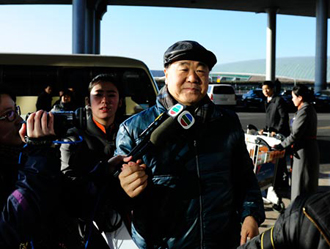Nobel Winner Mo Yan Called Gov't Stooge by Ai Weiwei
By wchung | 25 Feb, 2026
The awarding of the Nobel Prize for literature to Chinese novelist Mo Yan is being attacked by dissident artist Ai Weiwei as aiding enemies of humanity and freedom of speech, according to US-based Chinese newspaper Duowei News.
Ai’s attack against the Swedish Academy and Mo was made in an interview with a German radio station Wednesday as Mo was leaving Beijing for Stockholm where he will receive the prize of 8 million Swedish kronor ($1.2 mil.) on December 8. Mo will be accompanied by his wife, daughter and a party of translators during his seven-day stay in Sweden where he is scheduled to deliver three or four speeches.
Ai’s main reason for criticizing the award appears to be the fact that Mo is vice chairman of the Chinese Writers Association which he says has voiced support for the government’s censorship policies.
“It is a tragic decision for artists suffering under the censorship system,” Ai said.
The decision in October to award the literature Nobel prize to Mo was hailed by China as its first “true” Nobel in sharp contrast to the angry silence and denunciation that greeted news of the award of the Nobel peace prizes to the Dalai Lama and imprisoned democracy activist Liu Xiaobo.
The news of the award prompted immediate criticism from China’s rights activists. Ai denounced it as an insult to humanity and to literature, adding that Mo always stands on the side of power and has no personality.
“You can’t pigeonhole my work according to political affiliation,” Mo has said in defense of his work. “My writing from the 1980s has clearly been from the standpoint of moral integrity… The decision [by the Swedish Academy] to give me the award is a victory for literature, not for politics.”
Mo’s most famous work in the west is his first novel Red Sorghum, mainly because director Zhang Yimou turned it into an internationally acclaimed film starring Chinese beauty Gong Li. The film became an art-house mainstay for years.
“Despite his social criticism is seen in his homeland as one of the foremost contemporary authors,” the citation added, referring to Mo’s 1995 novel Garlic Ballads and essays of social criticism.
Mo was born into a farming family in 1955 in Gaomi, China. He left school while in his early teens during the Cultural Revolution to work in agriculture and in a factory. His early life was often difficult due to extreme poverty.
“Loneliness and hunger were my fortunes of creation,” he once said, and recalled having to eat tree bark at times to survive.
Ironically, it wasn’t until Mo joined the People’s Liberation Army in 1976 that he began to study literature and write. Possibly because of this, any social criticism suggested in his writings has been tempered by the recognition that the Communist Party has done much to elevate the lives of ordinary people.
Mo published his first short story in a literary journal in 1981. Six years later he established himself as a major literary talent with the publication of the Chinese version of what would later be translated as Red Sorghum, a novel set in his home province. It draws heavily on his experiences as a poor farmer’s son and as an agricultural worker during the difficult years of the Cultural Revolution. The novel can be read as an implicit endorsement of the Communist Party because it shows the suffering of farmers at the hands of wealthy landlords. The English translation was published in 1993 after Zhang’s acclaimed film created a demand for it.
Mo focused on China’s great social turmoil brought on by rapid changes in The Garlic Ballads. He reverted to a more historical perspective with Big Breasts and Wide Hips (1996). In Life and Death are Wearing Me Out (2006) Mo returns to a benign criticism of contemporary society. His most recent novel is Wa (2009), seen as an oblique critique of China’s one-child policy.
His latest novel, Sandalwood Death, is scheduled to be published in English translation in 2013.
In addition to the two Chinese authors, the Nobel Literature Prize has been awarded to Japanese authors Kenzaburo Oe in 1994 and Yasunari Kawabata in 1968.

Chinese novelist Mo Yan leaves Beijing on Wednesday Dec 5, 2012 to receive his Nobel Prize for literature in Stockholm on December 10, 2012.
Articles
- Tech Giants Required to Build AI Data Centers with Power Plants
- Takeaways from Trump's State of the Union Speech
- S. Korea's Demographic Crisis Eases with Rise in Birth Rates, Jump in Marriages
- New York Seeks $13.5 Billion Tariff Refund to Compensate Consumers
- Confusion Reigns As US Begins Collecting 10% Temporary Tariffs, Eyeing Rise to 15%
Asian American Success Stories
- The 130 Most Inspiring Asian Americans of All Time
- 12 Most Brilliant Asian Americans
- Greatest Asian American War Heroes
- Asian American Digital Pioneers
- New Asian American Imagemakers
- Asian American Innovators
- The 20 Most Inspiring Asian Sports Stars
- 5 Most Daring Asian Americans
- Surprising Superstars
- TV’s Hottest Asians
- 100 Greatest Asian American Entrepreneurs
- Asian American Wonder Women
- Greatest Asian American Rags-to-Riches Stories
- Notable Asian American Professionals

